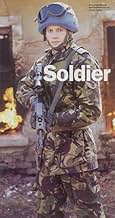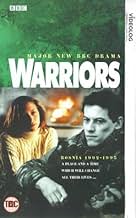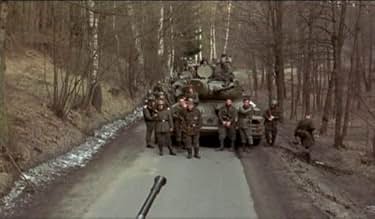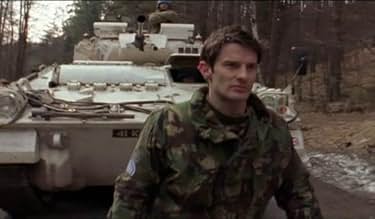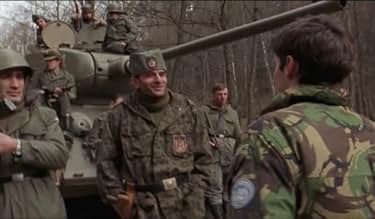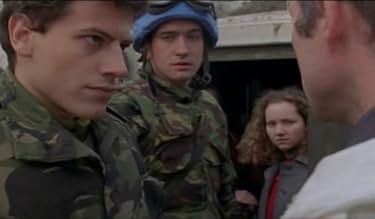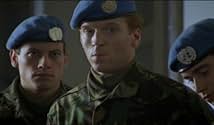After seeing devastating results of ethnic war in former Yugoslavia soldiers from UNPROFOR peace units find it impossible to return back to their civil lives in the UK.After seeing devastating results of ethnic war in former Yugoslavia soldiers from UNPROFOR peace units find it impossible to return back to their civil lives in the UK.After seeing devastating results of ethnic war in former Yugoslavia soldiers from UNPROFOR peace units find it impossible to return back to their civil lives in the UK.
- Won 2 BAFTA Awards
- 11 wins & 6 nominations total
Featured reviews
The MoD gave the makers permission to approach soldiers who had been involved in incidents so that they could replicate them for the screen, along with what the soldier's were actually thinking and feeling at the time.
A lot of incidents were rejected on the grounds that they would not be believed by the viewing public or were just to 'bloody'.
In addition, soldiers helped the actors wear their equipment properly, act properly etc.
How do I know this? Two of the incidents depicted I was involved in. I was in the Cheshire Regiment. I have since testified in 2 war crimes trials at the Hague.
No matter what you think, believe me it was far worse than what you see. You only see it, you don't smell it.
To this day (2007) most of us that were their in that first year still have a feeling that somehow we failed those poor people and our politicians were weak.
It is very, very well made and very, very realistic as to what it was like.
But one must bare in mind that the events depicted here is just in One particular region of Bosnia. Here it happenes to be the British-sector in the Travnic, Vitez, Amichi area. Some incidents I know happened (like the burned victims in the cellar) and some are most likely made up, but surely with the intent of realism in mind. Here obviosly the Serbs outnumbered the Muslims and therefor had most of the control. This I mention because after reading two comments here, both from Bosnia oe most likely to be Serb (saying that the depictions in this film are "black and white" portrayed) and one Muslim (Finding the film to be very realistic, having lived through the whole war in Sarajevo.)
Having been in bosnia myself I think I can appreciate this film more. Being shot in Tsjekkia it still looks very much like Bosnia. Although it was wery calm there then (in -99),long after the war was over. The UN had been replaced by the NATO forces(maybe a bit too late). But the work consisted of pretty much the same(except for the extreme tasks given as the result of war off cource) , driving around in our "sizu`s", working with local interpreters and keeping in touch with the local population. The following year I went to Kosovo, a more recent conflict. During that war NATO bombed Serbia in protest of the treatment given to the Albanians in Kosovo. When we arrived(early 2000) the situation had turned to the opposite and it was mostly the Serbs who had to be kept safe of the Albanians, who had started returning to Kosovo.
So I agree that there is no such thing as a "black and white" explanation of the tragedy. There was surely bad deeds made by all "sides", as in every war.
Film rates 10/10!
Despite its long length, this film depicts the frustration and personal pain British troops faced while in Bosnia, witnessing mass deaths of civilians and being unable to give proper assistance because of war 'restrictions'. The atmosphere is bleak and often tense, with the audience sympathising with the frustrated troops after 'clearing' up human body remains.
The aftermath and the pain the soldiers continue to feel after they get back to Britian is unsympathetic and superbly acted, especially from 'Band Of Brothers' star Damian Lewis and Matthew MacFadyen, and the scene when a soldier befriends a Bosnian civilian wearing a Manchester United shirt and has to hand him over to officials to be shot is one of the most powerful humanitarian war scenes in any film I have ever witnessed, with the Liverpool born soldier sinking to breaking point and bursting into tears.
It is easy to see why people may not like this. The pace is slow from time to time. Perhaps it is a touchy subject, but its a shame more people in America will not have the chance to see it. They should. It is compulsive viewing.
Harrowing and brilliant, Warriors will stay with you.
8.5 out of 10
You may think, due to its documentary character, the movie is awfully boring. The opposite is the case: Because of the excellent camera work, you get the impression of being a member of the British armoured infantrymen yourself. And while you are patrolling the area in white tanks in order to show UNPROFOR presence, the only thing you are allowed to do by higher orders of the UN command is to observe, unable to help, shield or evacuate the civilians from the atrocities committed by the soldiers and militia of each ethnical fraction. You start feeling as helpless as the British soldiers must have felt in reality. This movie is therefore very disillusioning and depressing.
In my opinion, this is a very powerful movie with the typical BBC documentation style, no Hollywood clichés. It should be seen by many, many more people, especially when you consider that this historic example of ethnic cleansing took place right on our doorstep only a decade ago and nevertheless today is almost forgotten. An impressive account of the tragic role of the UN during a bloody civil war.
Highly recommended! 10/10
Did you know
- TriviaThe Ministry of Defence assisted the production by providing Warrior armoured vehicles with crews during filming in the Czech Republic.
- Quotes
Pvt. Alan James: Get your dick out. Come on, let's see your dick. Or are you a eunuch? Did your mother bite it off when you were having sex? You want to rape me? Come on, speak to me. Why are you letting me insult you? I thought you were a man. Come on, fucker. You and me mate.
- Crazy creditsEpisode 1 did not have a closing-credits sequence, just a "To Be Continued" caption and a BBC copyright year.
- ConnectionsFeatured in Points of View: Episode #33.6 (1999)
Details
Contribute to this page


